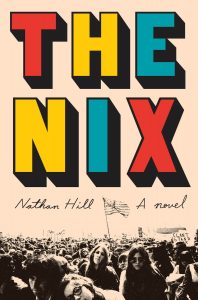Just when I was looking for a book to sweep me away, something fun to read, yet deeply insightful, Nathan Hill’s The Nix came haunting. In a good way though. The dreaming-about-reading-it-when-you’re-not kind.
“So we travel from the rolling darkness of pre-WWII Norway; to the ignorant fields of post-war Iowa; to the hippie and fascist infested streets of 1968 Chicago; to the doldrums and deviance of ‘80s suburbia; to the bloody absurdity of Iraq; to the failing entitlement of today’s college campus; to the vast, violent, magical “World of Elfscape.”
Nathan Hill’s main character, early 30s, sliding-by-lit professor/failed novelist, Samuel Andresen-Anderson, may indeed be haunted – or that could just be bad luck. Or possibly karma. Regardless, Samuel’s mother, Faye, who abandoned him just on the verge of puberty, certainly is, by mischievous Norse gnomes, no less. Not that this is a ghost story as much as a family drama/historical fiction/scathing satire that just happens to be influenced by ghosts.
But trying to put The Nix into any genre would discredit the 11 years of layering and “like ten drafts” that went into Hill’s debut novel. The present day of the novel takes place in 2011, 20 years after Faye left. Samuel prosaically teaches crappy uninspired students at a crappy liberal arts college by day. Then at night, he uses his high speed professorial internet connection to stage gloriously successful “World of Elscape” raids.
His life becomes evermore eventful when long-lost Faye shows up on all the news channels throwing pebbles at ultra-conservative presidential candidate Governor Packer, who actually carries a sidearm. As the story unfurls, Samuel, and America, find out that Faye was arrested once before: at the 1968 Democratic National Convention. When Samuel’s publisher, Guy Periwinkle, comes to collect the book he’s owed, with threats of lawsuits and foreclosures and such, Samuel offers up the only thing he’s really got: Faye’s tell-all story.
So we travel from the rolling darkness of pre-WWII Norway; to the ignorant fields of post-war Iowa; to the hippie and fascist infested streets of 1968 Chicago; to the doldrums and deviance of ‘80s suburbia; to the bloody absurdity of Iraq; to the failing entitlement of today’s college campus; to the vast, violent, magical “World of Elfscape.” Throughout the years and locales, Hill puts you right there, with descriptions at once accurate-to-the-smell and profoundly ridiculous. But it never gets so absurd that we lose track of the engrossing and timely story.
Along the way, it all works, hauntingly well. But it’s the frightening similarities between 1968 and now that make the The Nix so poignant — the people shouting in the street, politicians who game the system for their own nefarious gains, and a population at once complicit and offended. It’s like Periwinkle says: “Sometimes the country thinks it deserves a spanking, sometime it wants a hug… When it wants a hug, it votes Democrat. Im’ hedging on it’s a spanking moment right now.”
Well, if you need help understanding how we got so thoroughly spanked, The Nix is a great place to start.


